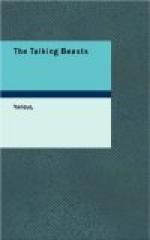And owe my safety to a friend.
You know my feet betray my flight;
To friendship every burden’s light,”
The Horse replied, “Poor honest Puss,
It grieves my heart to see you thus:
Be comforted, relief is near,
For all your friends are in the rear.”
She next the stately Bull implored;
And thus replied the mighty lord:
“Since every beast alive can tell
That I sincerely wish you well,
I may without offence pretend
To take the freedom of a friend.
Love calls me hence; a fav’rite Cow
Expects me near the barley-mow,
And when a lady’s in the case
You know all other things give place.
To leave you thus might seem unkind;
But see, the Goat is just behind.”
The Goat remarked her pulse was high,
Her languid head, her heavy eye.
“My back,” says she, “may do you harm.
The Sheep’s at hand, and wool is warm.”
The Sheep was feeble, and complained
His sides a load of wool sustained:
Said he was slow, confessed his fears;
For Hounds eat Sheep as well as Hares.
She now the trotting Calf addressed
To save from death a friend distressed.
“Shall I,” says he, “of tender age,
In this important care engage?
Older and abler passed you by—
How strong are those; how weak am I!
Should I presume to bear you hence,
Those friends of mine may take offence;
Excuse me, then; you know my heart,
But dearest friends, alas! must part.
How shall we all lament! Adieu!
For see, the Hounds are just in view.”
JOHN GAY
The Nightingale and the Glowworm
A Nightingale, that all day long
Had cheered the village with his song,
Nor had at eve his note suspended,
Nor yet when eventide was ended
Began to feel, as well he might,
The keen demands of appetite;
When, looking eagerly around,
He spied far off, upon the ground,
A something shining in the dark,
And knew the Glowworm by his spark;
So stepping down from hawthorn top,
He thought to put him in his crop.
The Worm, aware of his intent,
Harangued him thus, right eloquent:
“Did you admire my lamp,”
quoth he,
“As much as I your minstrelsy,
You would abhor to do me wrong,
As much as I to spoil your song;
For, ’twas the self-same Power Divine
Taught you to sing and me to shine;
That you with music, I with light,
Might beautify and cheer the night.”
The Songster heard his short oration,
And warbling out his approbation.
Released him, as my story tells,
And found a supper somewhere else.
Hence, jarring sectaries may
learn
Their real interest to discern,
That brother should not war with brother,
And worry and devour each other;
But sing and shine by sweet consent,
Until life’s poor transient night
is spent.
Respecting in each other’s case.
The gifts of Nature and of Grace.




